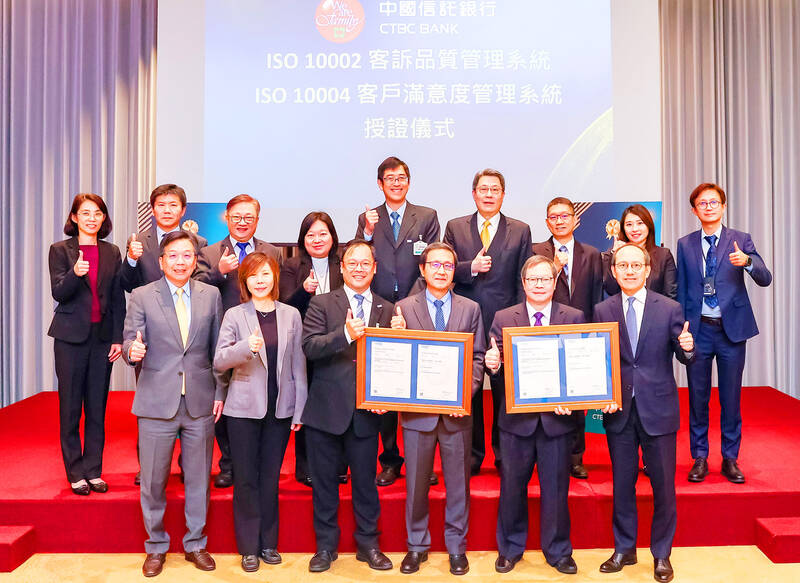CTBC Bank (中信銀行), which has held the ISO9001 quality management system certification for many years, said on Thursday that it recently obtained ISO10002 customer complaint management system certification and ISO10004 customer satisfaction management system certification, indications of the bank’s efforts in improving financial services and enhancing customer services.
These certifications show that the bank has attached great importance to customers and is actively moving to comply with international service standards, CTBC said.
CTBC Bank chairman James Chen (陳佳文) and vice chairman Austin Chan (詹庭禎) attended the ISO certification ceremony on Thursday at the CTBC Financial Park (中國信託金融園區) in Taipei’s Nangang District (南港), which was hosted by DNV Business Assurance Co (立恩威) general manager David Hsieh (謝振瑋) and observed by CTBC Financial independent directors Sam Yang (楊聲勇), Lau Cheung-chun (劉長春) and Christine Jih (季崇慧). DNV is one of the leading providers of accredited management systems certification.

Photo courtesy of CTBC Bank
The ISO10002 customer complaint management system provides a comprehensive process and guidance for handling customer complaints, while the ISO10004 customer satisfaction management system helps companies to establish effective methods and tools for monitoring and improving customer satisfaction, Hsieh said.
The system can also help companies improve the design of customized products and operating procedures, Hsieh added.
“Obtaining the ISO10002 and ISO10004 certifications will help the company improve customer trust and satisfaction and encourage corporate innovation,” Hsieh said.
CTBC has refined its processes and services, introduced innovative thinking, redesigned financial service processes and created a new customer experience, Chen said, adding that since the bank obtained the ISO9001 quality management system certification, it has worked to integrate its cross-department functions.
From document procedures to process design and control measures, all must comply with international standards, while subsequent implementation results and satisfaction surveys would be handed over to the coordinating unit for safekeeping, he said.
In addition, the bank has improved its tracking to comply with international standards, enhance customer satisfaction and brand trust, and achieve sustainable operations, he added.
Finally, Chen thanked the front-line staff for their efforts and encouraged all colleagues to work hard to improve customer services, handle complaints and understand customer needs, so as to provide financial services that are ubiquitous, comprehensive and attentive to customers.
Meanwhile, CTBC Bank has strengthened its efforts to provide services that are friendly to elderly people and the disadvantaged. This year, Chan led independent directors at CTBC Financial and CTBC Bank to experience the work of frontline customer service colleagues, and go to local branches to inspect the implementation of customer services for visually impaired, hearing impaired and physically challenged people.
They also reviewed the anti-fraud mechanism that helps to identify abnormal trading behaviors to ensure the safety of customer assets.
The financial firm would continue to provide better quality and diversified financial services, implement corporate social responsibilities and exert financial influence, it said.

AI TALENT: No financial details were released about the deal, in which top Groq executives, including its CEO, would join Nvidia to help advance the technology Nvidia Corp has agreed to a licensing deal with artificial intelligence (AI) start-up Groq, furthering its investments in companies connected to the AI boom and gaining the right to add a new type of technology to its products. The world’s largest publicly traded company has paid for the right to use Groq’s technology and is to integrate its chip design into future products. Some of the start-up’s executives are leaving to join Nvidia to help with that effort, the companies said. Groq would continue as an independent company with a new chief executive, it said on Wednesday in a post on its Web

RESPONSE: The Japanese Ministry of Finance might have to intervene in the currency markets should the yen keep weakening toward the 160 level against the US dollar Japan’s chief currency official yesterday sent a warning on recent foreign exchange moves, after the yen weakened against the US dollar following Friday last week’s Bank of Japan (BOJ) decision. “We’re seeing one-directional, sudden moves especially after last week’s monetary policy meeting, so I’m deeply concerned,” Japanese Vice Finance Minister for International Affairs Atsushi Mimura told reporters. “We’d like to take appropriate responses against excessive moves.” The central bank on Friday raised its benchmark interest rate to the highest in 30 years, but Bank of Japan Governor Kazuo Ueda chose to keep his options open rather than bolster the yen,

Even as the US is embarked on a bitter rivalry with China over the deployment of artificial intelligence (AI), Chinese technology is quietly making inroads into the US market. Despite considerable geopolitical tensions, Chinese open-source AI models are winning over a growing number of programmers and companies in the US. These are different from the closed generative AI models that have become household names — ChatGPT-maker OpenAI or Google’s Gemini — whose inner workings are fiercely protected. In contrast, “open” models offered by many Chinese rivals, from Alibaba (阿里巴巴) to DeepSeek (深度求索), allow programmers to customize parts of the software to suit their

Global server shipments are expected to surge to 15 million units next year, from 4 million units this year, with artificial intelligence (AI) servers accounting for about 30 percent, driven by massive capital spending by major cloud service providers, the Market Intelligence and Consulting Institute (MIC) said on Thursday last week. Major cloud service providers — including Google’s parent company Alphabet Inc, Microsoft Corp, Amazon.com Inc and Meta Platforms Inc — are projected to budget US$450 million for capital expenditure next year, up from US$400 million this year, MIC ICT [information and communications technology] Industry Research Center director Edward Lin